Ecommerce Excellence: Revealing The 13 Best Platforms For 2024

Cassandra Goethe
Marketing Coordinator
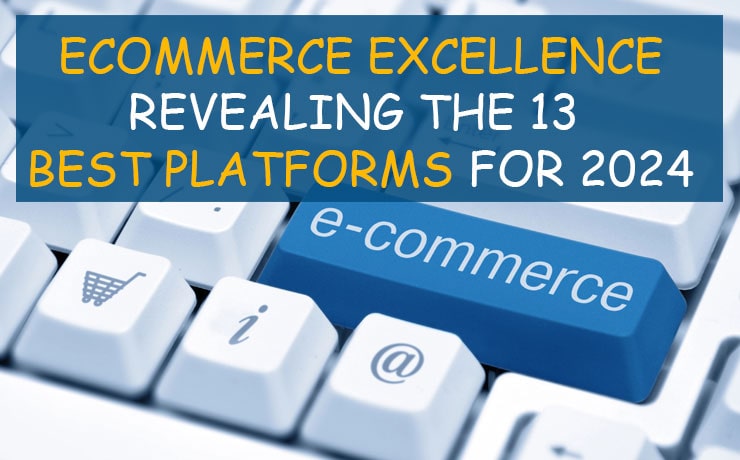
Selecting the right platform can make all the difference between a struggling online venture and a thriving digital storefront where ecommerce is concerned. As we step into 2024, the world of ecommerce platforms continues to develop, offering businesses a vast array of options to increase their online presence and drive growth.
The ongoing technological advancements, combined with shifting consumer behaviors, emphasize the important part that ecommerce platforms play in assisting businesses to adapt and succeed in the digital marketplace. Whether you’re a small boutique or a large enterprise, finding the perfect platform that aligns with your unique needs and goals is imperative.
How Can Businesses Achieve Ecommerce Excellence?
Achieving ecommerce excellence demands strategic use of advanced platforms customized to meet advancing market demands. Businesses that want to thrive online must harness the power of cutting-edge ecommerce solutions designed to optimize operations, boost customer engagement, and maximize sales.
The following are the 13 leading ecommerce platforms poised to redefine online retail in 2024:
| 1. Abra | 2. Fairing | 3. Triplewhale |
| 4. Hotjar | 5. Godatafeed | 6. Route |
| 7. Shopify | 8. Wix | 9. Shift4Shop |
| 10. BigCommerce | 11. Ecwid | 12. CoreCommerce |
| 13. Square Online |
These platforms embrace a diverse range of features and capabilities, catering to businesses of all sizes and industries. From intuitive user interfaces to hearty marketing tools, each platform offers unique strengths that help businesses thrive in the competitive ecommerce world.
In the following sections, we’ll peer briefly into each platform, exploring their key features, benefits, and suitability for various business needs. By leveraging these innovative solutions, businesses can unlock new opportunities for growth, efficiency, and success in ecommerce.
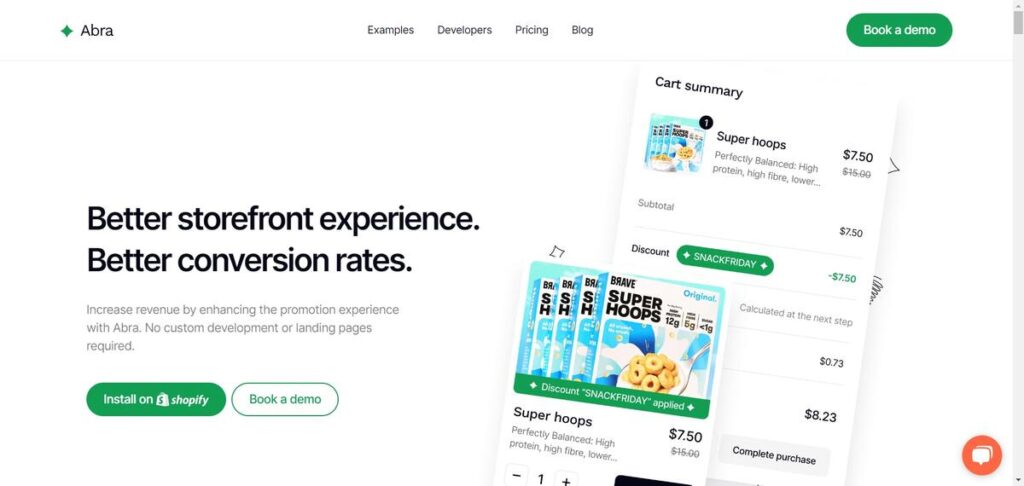
Abra is a versatile ecommerce platform that prioritizes simplicity and effectiveness for businesses to establish and manage online stores. The platform offers a range of user-friendly features to enable smooth and easy online selling experiences.
Key Features and Benefits:
- User-Friendly Interface: Abra is designed with simplicity in mind, making it accessible for beginners to create and manage their online stores efficiently.
- Customizable Templates: The platform provides customizable templates that allow businesses to create visually appealing and unique storefronts that resonate with their brand identity.
- Integrated Marketing Tools: Abra includes built-in marketing tools to help businesses promote their products and reach their target audience effectively.
- Inventory Management: Abra offers inventory management features to track stock levels, manage product variations, and fulfill orders efficiently.
- Secure Payment Processing: The platform supports secure payment processing, for a safe and reliable checkout experience for customers.
- Responsive Customer Support: Abra is known for its responsive customer support, offering assistance to users whenever needed.
Cons:
- Limited Advanced Features: Abra may lack some advanced e-commerce functionalities compared to more all-inclusive platforms.
- Integration Complexity: Integrating third-party apps or services with Abra can sometimes be challenging.
Abra is suitable for small to medium-sized businesses looking for an intuitive and straightforward ecommerce solution to establish their online presence and drive sales.
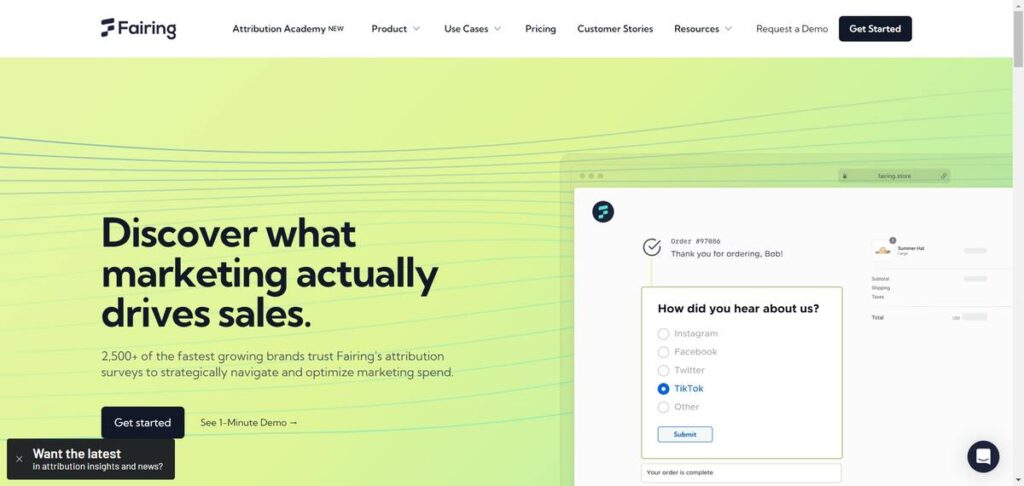
Fairing is an ecommerce platform designed to empower businesses in establishing and managing online stores with flexibility and scalability. The platform offers intuitive features designed to simplify the ecommerce journey for entrepreneurs and small businesses.
Key Features and Benefits:
- Flexible Templates: Fairing provides a variety of customizable templates that help businesses create visually stunning online storefronts that align with their brand identity.
- Seamless Integrations: The platform supports smooth integrations with third-party tools and services, allowing businesses to expand their ecommerce capabilities.
- Order Management: Fairing offers complete order management features, including inventory tracking, order fulfillment, and shipping management.
- Marketing Tools: Fairing includes built-in marketing tools to help businesses promote their products and drive sales through effective campaigns.
- Responsive Customer Support: Fairing is backed by responsive customer support to assist users with any inquiries or issues they encounter.
Cons:
- Limited Advanced Analytics: Fairing may have limited advanced analytics capabilities compared to more specialized ecommerce platforms.
- Customization Complexity: Advanced customization options may require technical expertise.
Fairing is ideal for businesses that want a scalable and feature-rich ecommerce solution to launch and grow their online presence.
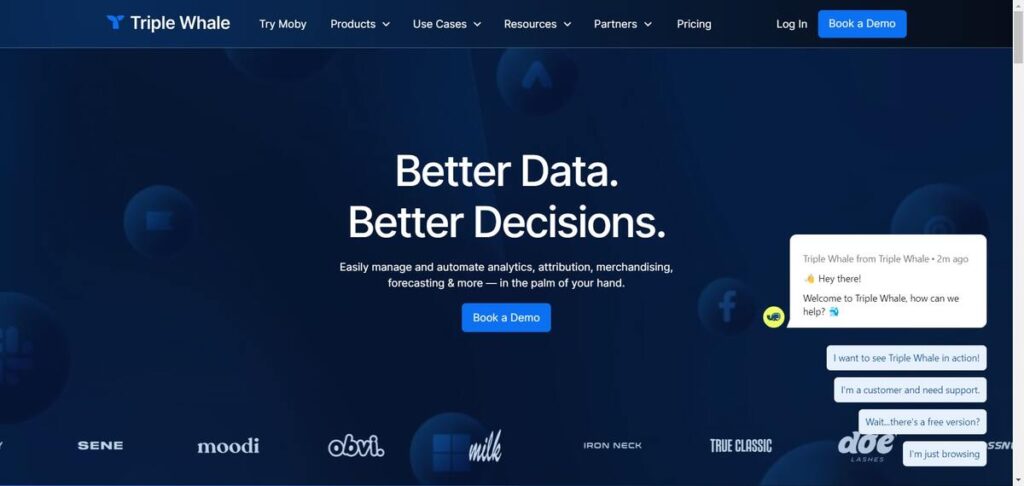
Triplewhale is a full ecommerce platform focused on helping businesses succeed in the digital marketplace. With a suite of advanced tools and features, Triplewhale offers a holistic solution for creating, managing, and growing online stores.
Key Features and Benefits:
- Advanced E-commerce Functionality: Triplewhale provides advanced ecommerce features, including product management, customizable storefronts, and integrated marketing tools.
- Multi-Channel Selling: The platform supports multi-channel selling, allowing businesses to reach customers across various online platforms and marketplaces.
- Data Analytics and Reporting: Triplewhale offers powerful data analytics and reporting capabilities, providing actionable insights to optimize sales and marketing strategies.
- Scalability and Flexibility: Triplewhale is designed to scale with businesses of all sizes, offering flexible plans and resources to accommodate growth.
- Secure Payment Processing: The platform provides secure payment processing, protecting customer transactions and sensitive information.
Cons:
- Complex Setup for Beginners: Triplewhale may have a steeper learning curve for beginners due to its advanced features and functionalities.
- Higher Cost: Compared to some basic ecommerce platforms, Triplewhale’s features may come at a higher price point.
Triplewhale is great for businesses that need a sophisticated ecommerce solution with advanced features and scalability.
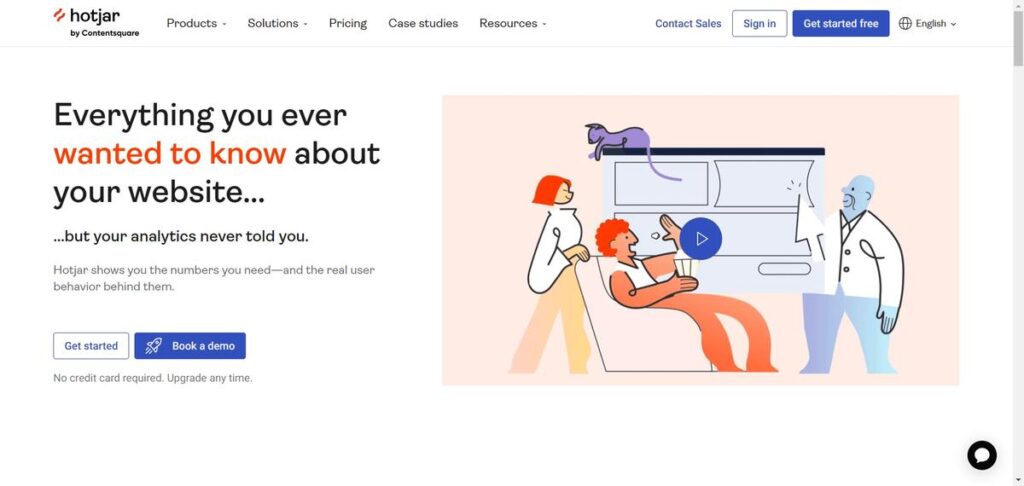
Hotjar is a powerful analytics and feedback platform designed to help businesses understand user behavior and optimize website performance. While not a traditional ecommerce platform, Hotjar plays a big part in heightening the user experience and conversion rates of online stores.
Key Features and Benefits:
- Behavior Analytics: Hotjar offers heatmaps, session recordings, and user surveys to gain deep insights into how visitors interact with your website.
- Conversion Rate Optimization (CRO): By analyzing user behavior, Hotjar assists businesses in identifying areas for improvement and implementing effective CRO strategies.
- Feedback and Polls: The platform allows businesses to collect direct feedback from users through polls and surveys, expediting data-driven decision-making.
- Visitor Feedback: Hotjar provides tools to capture visitor feedback and sentiment, helping businesses customize their offerings to customer preferences.
- User-Friendly Interface: Hotjar offers an intuitive dashboard and user interface, making it accessible for businesses to use powerful analytics tools.
Cons:
- Not a Full Ecommerce Solution: Hotjar is primarily focused on analytics and user feedback and does not provide core ecommerce functionalities like product management or payment processing.
- Additional Integration Required: Businesses may need to integrate Hotjar with other ecommerce platforms to fully leverage its insights for optimization.
Hotjar is recommended for businesses that want to improve website performance, enrich the user experience, and optimize conversion rates through advanced analytics and feedback tools.
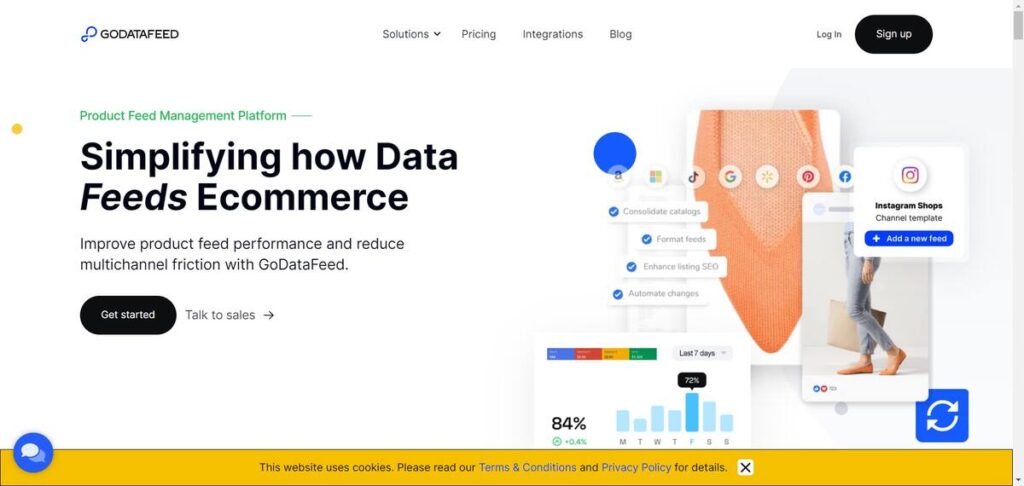
Godatafeed is a complete data feed management platform made for ecommerce businesses to help optimize product visibility across multiple online channels. The platform specializes in simplifying product data management and synchronization to drive sales and expand market reach.
Key Features and Benefits:
- Product Data Optimization: Godatafeed offers tools to optimize product data, including automated data mapping, categorization, and enrichment for improved visibility.
- Multi-Channel Integration: The platform supports smooth integration with online marketplaces, comparison shopping engines, and advertising platforms to maximize product exposure.
- Automated Feeds and Updates: Godatafeed automates the process of generating and updating data feeds, for accuracy and consistency across all sales channels.
- Performance Analytics: Godatafeed provides performance analytics and insights to track product performance, sales metrics, and ROI from different channels.
- Customization and Flexibility: Businesses can customize product listings and data feeds based on specific channel requirements and target audience preferences.
Cons:
- Learning Curve: Godatafeed may have a learning curve for users unfamiliar with data feed management and optimization.
- Cost Considerations: Pricing for Godatafeed may vary based on usage and the number of products and channels, potentially leading to higher costs for larger businesses.
Godatafeed is good for ecommerce businesses wishing to increase product visibility, optimize data feeds, and effectively manage multi-channel selling strategies.
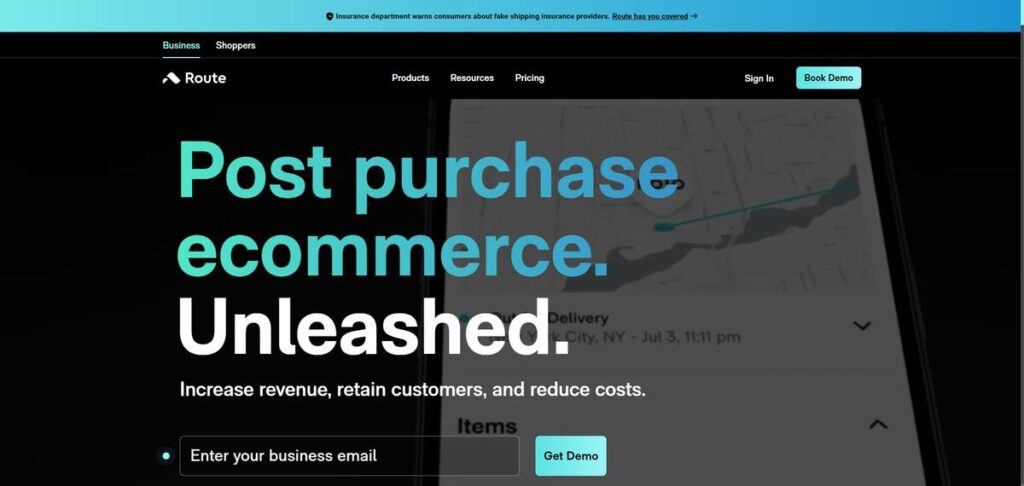
Route is a platform designed to heighten the post-purchase experience for online merchants and their customers by providing package protection and order tracking solutions. While not a traditional ecommerce platform, Route adds value by improving customer satisfaction and reducing shipping-related issues.
Key Features and Benefits:
- Package Protection: Route offers package protection services that cover lost, stolen, or damaged shipments, providing peace of mind to both merchants and customers.
- Order Tracking and Visibility: The platform provides real-time tracking updates and delivery notifications, allowing customers to stay informed about their orders.
- Automated Claims Management: Route automates the claims process for lost or damaged packages, simplifying customer support and reducing administrative burden.
- Branded Order Tracking Page: Merchants can customize the order tracking experience with a branded tracking page, increasing brand visibility and customer engagement.
- Enhanced Customer Experience: Route contributes to a positive post-purchase experience, promoting trust and loyalty among customers.
Cons:
- Specific Focus: Route’s services are specific to package protection and order tracking, and it does not provide core ecommerce functions like product management or payment processing.
- Additional Integration Required: Businesses may need to integrate Route with their existing ecommerce platforms to use its package protection and tracking solutions effectively.
Route is recommended for online merchants that need to enrich their post-purchase operations, improve customer satisfaction, and reduce shipping-related issues through comprehensive package protection and order tracking services.

Shopify is the most popular ecommerce platform for US websites, with 28% of the market according to BuiltWith. It’s an all-in-one platform that allows you to create and manage an online store with ease.
Due to its remarkable mix of features, user-friendliness, and versatility, it really stands out. With professionally designed templates and an easy drag-and-drop interface, it’s completely accessible, even to newcomers.
Shopify is built on a full suite of tools: unlimited product listings, inventory management, 100+ payment providers, multiple sales channels and high-converting checkout.
Pros:
- User-friendly interface
- Versatile, with 150+ themes
- Excellent marketing tools and social integration
Cons:
- Transaction fees for third-party payment processors
- Cost of premium apps adds up
- Extensive customization requires technical expertise
Who should use it? Small and medium-sized businesses that want an easy-to-use, all-in-one solution could benefit from using Shopify. With its extensive app store and API functionality (as well as advanced and enterprise-level plans), the platform is also scalable and able to meet your inventory, order management, and other needs as your business grows.
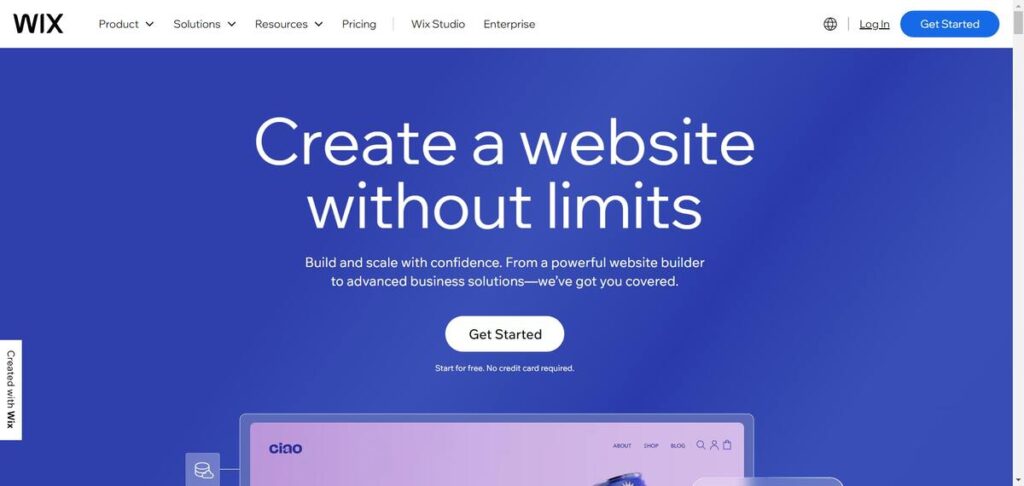
Wix is ideal for startups aiming to establish an online presence quickly and affordably. Its intuitive drag-and-drop builder simplifies professional store creation. Note: Storage is limited compared to others (e.g., 50 GB in the $27/month plan vs. unlimited). Wix prioritizes website creation over ecommerce features, potentially requiring costly app additions.
Pros:
- Quick setup
- Affordable
- User-friendly for beginners
Cons:
- Not ideal for complex ecommerce needs
- App Market fees accumulate
- Lacks a free ecommerce plan
Best for small businesses valuing simplicity and speed in website setup, particularly startups needing an easy, professional online store.

Shift4Shop offers a convenient way to launch a business website with minimal effort. Its website builder and built-in order management solutions drive home the all-in-one offering; and it will assist in the betterment of search engine rankings. Features like mobile-focused design and extensively customizable metadata could help your small business achieve higher search rankings.
Pros:
- Free, if you can meet the minimum
- Variety of features creates value
- Comprehensive SEO tools
Cons:
- Must use Shift4 payments in free plan
- Customer service gets mixed reviews
- Some users complain of complex setup
Who should use it? Shift4Shop’s pricing model is a big draw if you’re sure you can make the revenue threshold and want to use its payment processor. There are many marketing and SEO features, so businesses with a strong focus on improving online visibility and driving organic traffic should consider Shift4Shop.
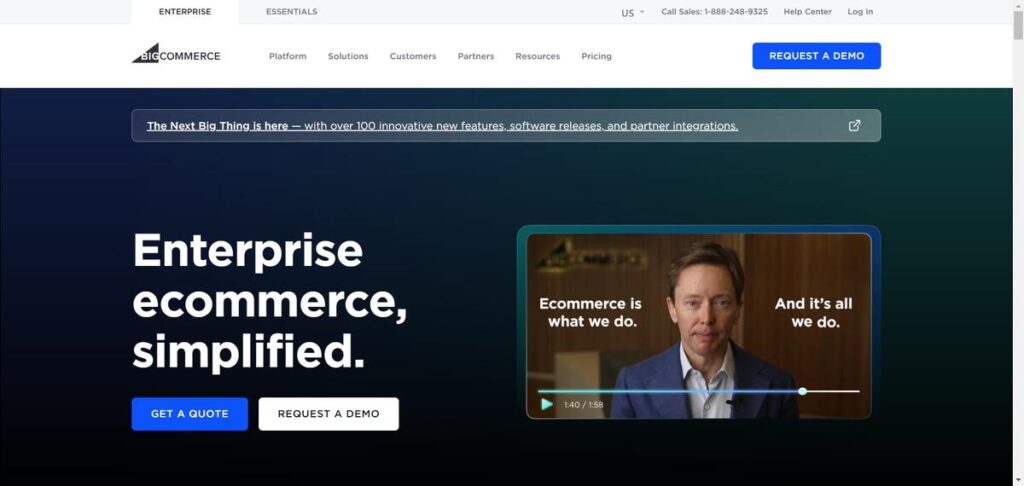
BigCommerce is an enterprise-level ecommerce solution that promises a simplified approach to site building and order management. It excels at B2B – and B2C (business-to-consumer) – sales, with a feature-rich platform that offers wholesale selling, bulk pricing and integrations with various wholesale-specific payment gateways.
BigCommerce complies with several security standards. The bulk edit and product import/export functions are exceptional.
Pros:
- Focus on complex B2B management
- Advanced sales tools
- Secure, compliant platform
Cons:
- Advanced features unnecessary for many small businesses
- Only 12 free templates
- Plans have sales limits
Who should use it? Businesses involved in B2B sales or those searching for an advanced tool that supports complex pricing structures and high-level product management should consider BigCommerce.
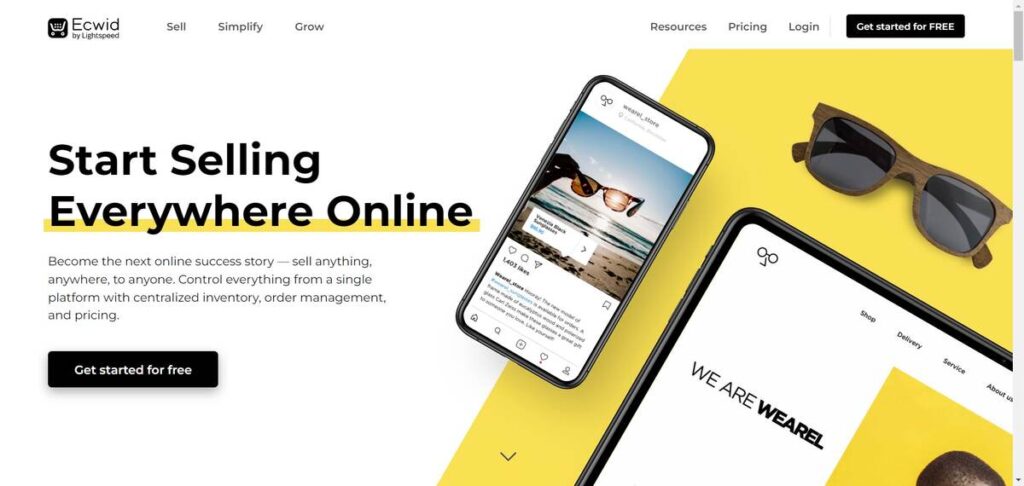
Ecwid is a standout free ecommerce store option that provides a free shopping cart and store with centralized inventory and order management built in.
It shines a great omnichannel ecommerce platform, giving your customers a consistent and smooth shopping experience across all sales channels. Ecwid allows you to set up one catalog and use it anywhere – from Ecwid’s Instant Site to CMSes like WordPress to custom-built websites. It also allows you to sell on Amazon and social media including Facebook, Instagram, TikTok, and more.
You can even turn your store into a mobile app, and it integrates with POS services to sell in-store.
Pros:
- Smooth integration between sales channels
- Centralized management of inventory and customer data
- User-friendly interface
Cons:
- Only 5 products in the free plan and 100 in Venture
- Limited analytics and automation
- Reliance on App Market for advanced features
Who should use it? Businesses that want to integrate product and inventory management across channels to provide a consistent experience for customers whether they shop online, via mobile or in-store should consider Ecwid.
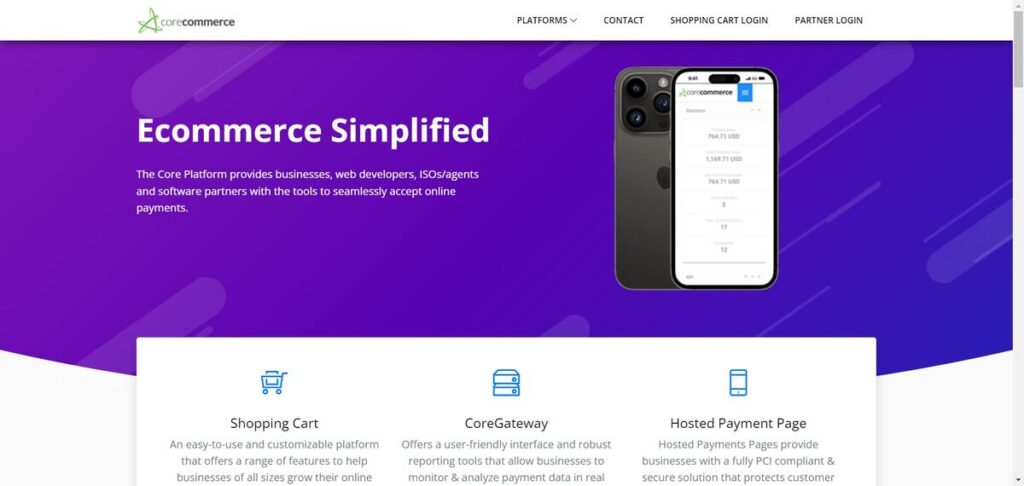
CoreCommerce is a straightforward ecommerce solution, offering the Core Platform, which provides ready-to-use tools for setting up a shopping cart and accepting online payments.
CoreCommerce is a great choice if your business prioritizes data-driven decision-making. Of its many features, analytics real-time data reporting is a major highlight, covering everything from sales and taxes to affiliate statistics and keyword/search term reports.
Pros:
- 15-day free trial
- Strong reporting and analytics
- Feature variety suitable for small business
Cons:
- Paid plans limit product count
- No mobile app
- No POS for in-person sales
Who should use it? Businesses without extensive product portfolios that want a straightforward platform or those that value data analysis and insights should consider CoreCommerce.
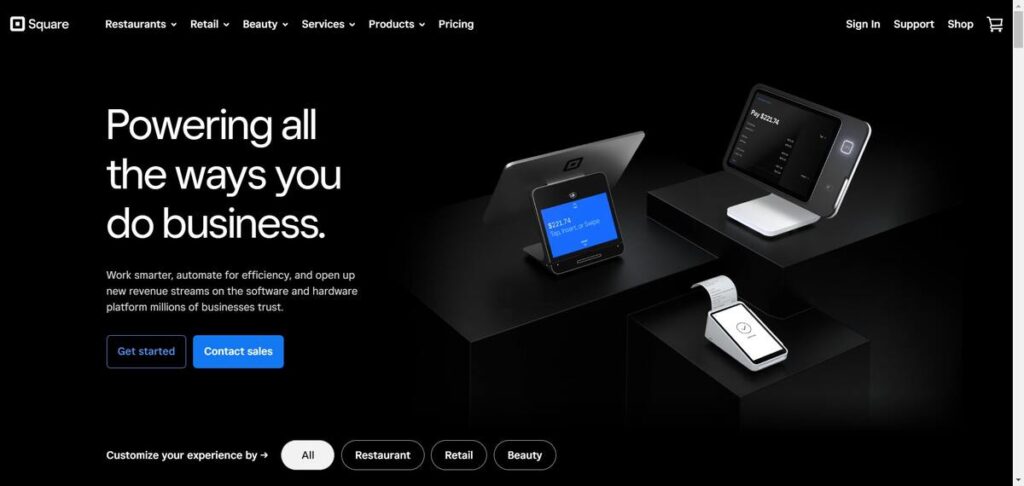
Square Online has a clear focus on brick-and-mortar stores with its feature offerings, making it simple to accept and manage orders both online and in-person within a simple system. It also provides a hassle-free and straightforward setup experience and lots of great features – including multiple fulfillment options, POS integration, and a variety of mobile-first theme designs.
Much of Square’s benefit comes from its use in physical stores. While there are plenty of ecommerce-only features, you’re not getting as much value without using the POS software. It also has limited customer support hours and doesn’t have integrations with Amazon and other major marketplaces.
Pros:
- Quick setup and user-friendly interface
- Great integration between physical and online stores
- Unlimited products
Cons:
- No integration with Amazon or other marketplaces
- High focus on physical stores and POS Marketing add-ons can get pricey
Who should use it? Square Online provides easy and quick setup with very few issues, so if other platforms are giving you grief, it’s a great choice. Businesses with an online and physical presence will enjoy the excellent POS integration.
Let Us Know How We Can Support Your Ecommerce Business
Are you in search of the perfect ecommerce platform to elevate your business? Look no further than SmartSites, your premier digital marketing partner. We specialize in guiding businesses like yours to select and leverage the right ecommerce solution tailored to your unique needs.
At SmartSites, we offer support across essential aspects of your business. Beyond assisting with e-commerce platforms, our expertise extends to marketing, web design, SEO, email/SMS marketing, and more. Whatever challenges you face, SmartSites is your one-stop solution.
Ready to take your business to the next level? Reach out to our marketing experts today! Contact us today at 201-870-6000 or use our convenient online form to get in touch.
Put your business on the path to success with SmartSites and let’s grow together in the dynamic digital landscape.
 Free
Consultation
Free
Consultation Free
Google Ads Audit
Free
Google Ads Audit






